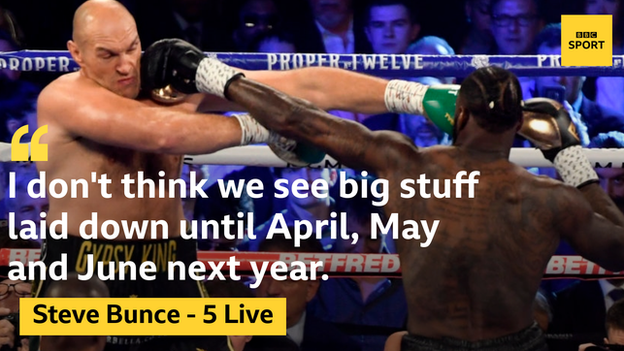Coronavirus: Boxing's biggest fight nights could be 12 months away, says Steve Bunce
- Published

Steve Bunce believes big fights are some time away while promoter Bob Arum says Fury v Wilder III faces challenges
Boxing's biggest fights may be a year away from happening because of the coronavirus pandemic, BBC Radio 5 Live's Steve Bunce has warned.
The sport has been shut down in most countries as a result of the outbreak and the possibility of staging fights without fans when restrictions are eased has been raised by some promoters.
The sport is wrestling with how staging fights without fans can make business sense, how fight nights could put added pressure on emergency services and how fighters can cross borders when travel is restricted.
In this week's 5 Live Boxing podcast, BBC Sport boxing correspondent Mike Costello and analyst Bunce debated whether the shutdown will prompt a deluge of big fights being made or if the threat of a second wave of the virus may prevent that.
Bunce said: "If we are all expecting a second wave - and I am no expert - when do we plan any of these potential big fights?
"I think we will tread water for seven or eight months and I don't think we will see big stuff laid down until April, May and June next year. In theory people will then have a better idea of where we are at going forward. We can't make a mistake and jump early.
"Promoters like Frank Warren, Bob Arum and Eddie Hearn, they don't want to launch into massive fights where they are flying people in for promotional gigs some time in August or September. I don't think that will be enough time to put the fights together and you can't rush them through. As Arum has said, fights behind closed doors, who is going to compensate for that loss of money on the gate?
"In that sense, the big ones might be a way off yet."
'Fury-Wilder III hit by challenges' - Arum
Huge fights have already been lost, with the coming weekend originally scheduled to feature world champions Josh Taylor and Saul 'Canelo' Alvarez, as well as heavyweight Dillian Whyte in big arena events.
Arum said world heavyweight champion Tyson Fury's third bout with Deontay Wilder has become a "wait and see" fight.
The pair were set to fight in July but with Las Vegas shut down, October became a target.
Arum, 88, said three issues exist in being able to put the contest on and ensure it generates the kind of money expected.
"There's a travel ban," Arum told ESPN. "How do we get Fury over here to get ready for the fight, assuming we're going to do the fight in the United States?
"Second, you have to do that fight with a live gate. The live gate for the last fight, the second fight, the February fight, took in $17m (£13.7m). That was a significant portion of the revenue that paid the fighters and so forth. How do you replace that? And the answer is, you can't.
"And then, thirdly, we charge $80 for a pay-per-view for a person buying at home. Two problems with that: Can people, after going through all this economic hardship, can they afford to pay $80 to watch a fight no matter how attractive the fight is?
"A lot of people - we know this from our surveys - who bought the pay-per-view, buy it and have, like, 10 other couples come over and watch the fight in their house, everybody contributes money. How willing are people going to be to open up their homes to big groups of people?
"All of these are much harder issues to solve than just doing fights in a closed environment, which we will hopefully start to do some time in June."